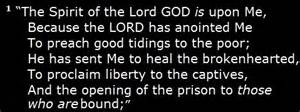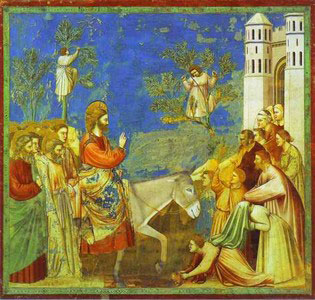“Proclaim Good News!”
Luke 4:14-21 (4:18) and Romans 12:1-13 – January 20, 2019 – Ecumenical Prayer Service for Christian Unity, St. Martha’s Catholic Church, Morton Grove, Illinois

[The (Ecumenical) John 17 Fellowship is an informal group of Catholic and Protestant churches in the northwest Chicago suburbs. We celebrated the Week of Ecumenical Christian Unity with a prayer service for unity this afternoon, on Sunday, January 20. I was asked to preach. Here is my sermon.]
What do you want to be when you grow up? That is a familiar question to many children and young people. I dare say lots of people wonder what they will be as adults, today.
I wonder whether Jesus was asked that question while He was growing up? In our Gospel reading today from St. Luke, our Lord Jesus makes some bold statements while at worship with His fellow townsfolk in Nazareth. But first, we ought to set the scene.
Sure, this was the very beginning. Jesus was just starting to make a name for Himself as an itinerant rabbi. And, He came to His hometown, the place where He grew up. Maybe where the butcher and baker down the street were good friends with His parents from way back. Maybe the real estate agent across the square sold His parents their house some years before, the house where His mother Mary still lives. In other words—I suspect everyone in that town was there in the synagogue that day to hear what the Rabbi Jesus—their hometown boy!—had to say.
Jesus already had generated some buzz in the greater Nazareth area. “Have you heard the latest about that Jesus? The one who says He is a Rabbi? The one who was baptized in the River Jordan by that Baptizer fellow? And, there was something about the heavens cracking open, a dove flying out of a clear blue sky—and a voice from heaven! I’m not saying all this was for real or not, but that is what people are saying about this Jesus. You know, the guy from our town.”
Our Lord Jesus had hardly started to do His public ministry, and people were already talking about Him and what had happened in His life. Especially in Nazareth, the town where He had grown up.
In this scene from the synagogue in Luke chapter 4, the townsfolk did what they habitually did every week in worship. In addition to the prayers, the townsfolk read from the Bible, and then someone made an interpretation of the reading. Biblical exegesis, or midrash.
Isn’t that what we do in worship each week? In addition to the prayers, we also read from the Bible, and then someone (usually the priest or pastor or minister, but not always) makes an interpretation of the reading.
The Bible is so important, to all of us. Here in our Gospel reading today, the Rabbi Jesus reads from the book of the prophet Isaiah. Ecumenically, all of us here from different church traditions and even various places across the globe can agree that the Bible—the Word of God—is one important way that God communicates with us all.
When I was younger, a teenager and in my twenties, I memorized a number of verses from the Bible, from both the Hebrew Scriptures and from the New Testament. I have not kept up with my bible memorization, but I still remember a good deal. Like, for example, two verses from Psalm 119. Verse 11, “Your Word have I hid in my heart, that I may not sin against You.” And Verse 105, “Your Word is a lamp to my feet and a light to my path.”
These verses are just two of the many places in the Bible that remind us of the importance of God’s Word, and what a central role the Bible ought to have in our lives. Our Lord Jesus tells us so. What’s more, He shows us what we are to do.
Our Lord Jesus was attending worship services—as was His custom. He was reading the Bible. What’s more, Jesus always lived out what the Bible said to do. Always.
Listen again to what our Lord Jesus read: “He found the place where it is written: “The Spirit of the Lord is on me, because God has anointed me to proclaim good news to the poor. He has sent me to proclaim freedom for the prisoners and recovery of sight for the blind, to set the oppressed free, and to proclaim the year of the Lord’s favor.”
In another sermon two and a half years ago, I preached on this same Gospel reading. I told my congregation that this was where our Lord Jesus preaches His first recorded sermon. It is quite a bit like political campaigns. The various candidates all have their position distilled down to a simple message. What they stand for. What they will strive to do. Just so, with Jesus. Jesus is here to proclaim the Gospel. Share the Good News, indeed!
The Apostle Paul was so moved and energized by the risen Jesus that he made it his life’s work to share that Good News. Paul went to endless places and preached the Gospel to just about everyone he met. What is more, he used his organizational skills to help the growing gatherings of believers, as we can see from our second reading from the book of Romans today.
These words from St. Paul not only tell his fellow believers about their gifts and how much God has blessed each of them, individually, but also to let them know how they ought to live together, and bless each other as a church community. We can take that one step further, and see how Paul’s fellow believers—that is all of us, as Christians—ought to live in love and justice in our neighborhoods, and with our fellow citizens.
Let’s go back to Luke chapter 4. My first thought is, I’m not poor! Or, a prisoner, or blind, or oppressed, either. I am not any of those things. Seriously, what is the Rabbi Jesus saying here? Does He have some kind of secret message? If these are the types of people Jesus says He is going to preach and minister to, I am not sure I would be comfortable with it.
All that talk about the poor and blind, grief-stricken and oppressed, that is giving me some hesitation about following this new Rabbi Jesus.
But, let’s take a closer, deeper look. Here Jesus is addressing the poor. Could that be the poor in spirit, as well as poor, materially-speaking? Next up, He addresses the prisoners. Perhaps, prisoners of sin? Then, speaking to the blind; blind to the love and gifts of God in their lives? And, our Lord Jesus came for the oppressed. Oppressed by anxiety, doubt, fear, anger, self-loathing, self-pity, self-righteousness. (I could go on, but I think you all have the idea.)
That is why Jesus has come to earth. That is His message. Our Lord gives His purpose statement, distilled down to the pure essence.
Our Lord Jesus speaks to each one of us, as individuals. The Apostle Paul speaks to us as a group, to the church.
So—what do you want to be when you grow up? Do the words of Paul or the purpose statement of Jesus make a difference to you? Do these words change your life or your path? Following God’s Word can make all the difference in the world. It did for our Lord. It did for Paul. Will following God’s Word make a difference for you and me today?
God willing, may it be so.
Alleluia, amen.



